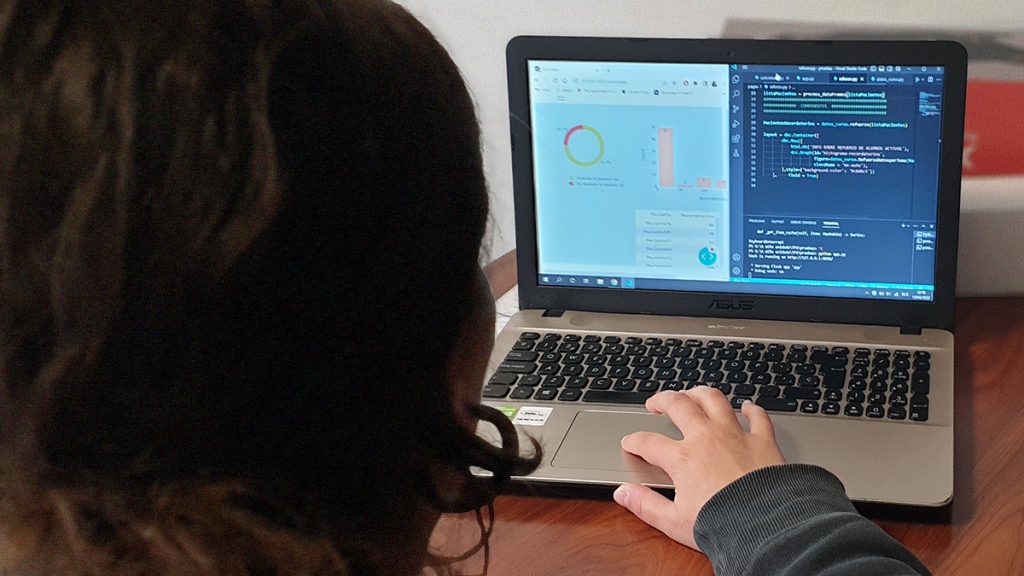Carrying out the final degree project (bachelor’s or master’s) in a company is a highly appreciated option by our students. It enables them to approach the working world but from a training perspective with professional and instructional guidance.

What are the rules to follow?
By clicking the buttons below, you can consult the Regulations for the Completion of the Final Degree Project (TFG) and the Regulations for the Completion of the Final Master’s Project (TFM) at the University of Vigo:
In both cases, you will see that in Article 3.5, they state:
“The final degree project may be carried out in institutions or companies external to the University of Vigo, under the terms established in the signed institutional agreements. In such cases, there will be a co-tutor from the institution or company. The academic tutor will share the direction and guidance tasks with the co-tutor, and it will always be the responsibility of the academic tutor to facilitate the management.”
You can also consult the Regulations and Procedures for Final Degree Projects (TFG) and Final Master’s Projects (TFM) of the School of Telecommunication Engineering (EET) by clicking the button below:
This regulations specify the number of hours that must be completed in the collaborating entity to be at least 80% of the total considered hours:
- TFG of the Bachelor’s Degree in Telecommunication Technologies Engineering (GETT): 240 out of 300 hours.
- TFM of the Master’s in Telecommunications Engineering (MET): 600 out of 750 hours.
- TFM of the Interuniversity Master’s in Cybersecurity (MUniCS): 300 out of 375 hours.
- TFM of the Master’s in Industrial Mathematics (M2i): 180 out of 450 hours.
- TFM of the International Master’s in Computer Vision (imcv): 648 out of 810 hours.
- TFM of the Master’s in Quantum Information Science and Technologies (MQIST): 300 out of 375 hours.
- TFM of the University Master’s in Internet of Things – IoT (MUIoT): 120 out of 150 hours.
What is the process for completing a TFG/TFM?
The process of completing a final project at the EET begins with the presentation of a proposal for a topic that suggests solving a problem or developing a project in the field of Telecommunication Engineering.
Topics can be proposed by faculty, students, or external collaborating entities, but to be approved, they must have a member of the EET faculty acting as the academic tutor.
How are topics proposed for TFG/TFM?
- When the collaborating entity has already agreed on the topic with someone acting as the academic tutor, that person will make the proposal directly using the established channels at the center.
- Otherwise, if the external entity wants to make a thematic proposal but does not have an academic tutor, the external entity must fill out the form attached as an Annex to the following document and send it to the coordinator of Final Degree Projects at EET (teleco.tfg.tfm@uvigo.gal):
What is the TFG/TFM calenda?
The procedure for submitting proposals, finding an academic tutor, and publishing and assigning students will follow the calendar indicated below:
CALENDAR for the GETT degree and the MET, M2i, MQIST and MUIoT master’s programs
| Reception of proposals from collaborating entities | September 1 – September 21 |
| Search and assignment of the academic tutor | September 22 – October 15 |
| Search and assignment of students | October 16 – November 30 |
CALENDAR for the MUniCS, imcv master’s programs
| Reception of proposals from collaborating entities | May 1 – May 21 |
| Search and assignment of the academic tutor | May 22 – June 15 |
| Search and assignment of students | June 16 – July 31 |
It is not guaranteed that academic tutors and students can be assigned to the proposals made.
Anything else to keep in mind?
Completing Final Degree Projects at the EET requires that a specific agreement between the entity and the University of Vigo for the completion of these projects be in force.
Final Degree Projects at the EET are published in an open repository. It is possible to complete projects under a confidentiality clause, although this is limited to a non-disclosure period of 2 years for the presented projects.
Interested in offering final degree projects (TFG/TFM)?
Contact with the Final Degree Projects Coordination by mail
teleco.tfg.tfm@uvigo.es
